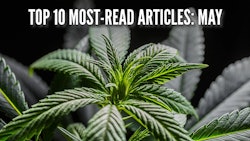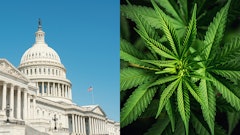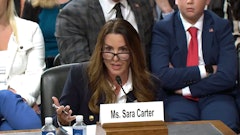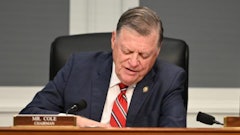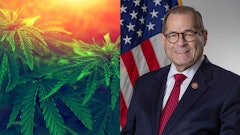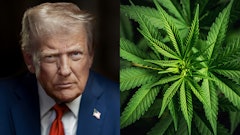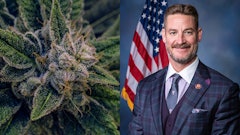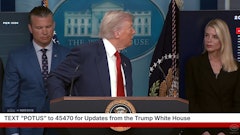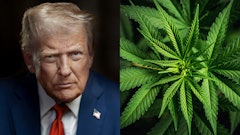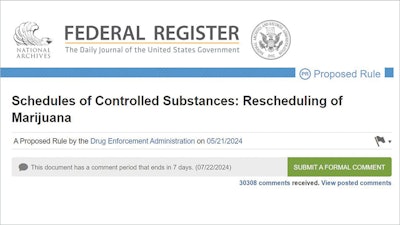
With one week left in the public comment period on the Drug Enforcement Administration’s (DEA) proposed rule to reclassify cannabis to a Schedule III drug under the Controlled Substances Act (CSA), 30,640 comments have already been submitted. More than 1,100 comments were submitted in the past three days, and nearly 3,000 in the past seven days.
The notice of proposed rulemaking was published by the Department of Justice (DOJ)—which oversees the DEA—in the Federal Register on May 21, starting the 60-day comment period, which ends July 22. In the
notice, U.S. Attorney General Merrick Garland proposed rescheduling cannabis and solicited comments on preliminary findings. The CSA requires that changes to a drug’s schedule be made through formal rulemaking on the record after opportunity for a hearing. (Cannabis Business Times reached out to the DOJ but has not been able to confirm whether or not requests for hearings have been made or if so, whether any have been granted.)
“Although not required, the DEA administrator may grant an in-person hearing and select an administrative law judge (ALJ) to preside,” according to Morgan Lewis law firm. “After a review of the record, the ALJ then provides their recommendation to DOJ, which makes the ultimate rescheduling determination.”
The notice of proposed rulemaking came after the U.S. Department of Health and Human Services (HHS) recommended to the DEA that cannabis be moved to a Schedule III classification.
RELATED: White House Moves to Reschedule Cannabis in ‘Monumental’ Decision, Biden Says
While CBT was not able to read the tens of thousands of public comments, it reviewed a significant number of them. Many comments voiced support for rescheduling; many others stated that rescheduling falls short of ending the societal harms that would continue under Schedule III and that cannabis should be descheduled. Others opposed rescheduling with reasons ranging from the “cannabis is a gateway drug” theory to claiming harms to society related to cannabis use disorder and impact on youth, to stating there is no currently accepted medical use.
Dr. Peter Grinspoon, a medical doctor and well-known cannabis expert, wrote in his public comment:
“I am a primary care physician and cannabis specialist at Harvard Medical School. I have written and spoken extensively about medicinal cannabis during my twenty-five year career as a doctor. I strongly believe that cannabis should be descheduled not rescheduled as it is markedly less harmful than tobacco or alcohol (which, as you know, are descheduled) and as it has fairly vast therapeutic use in [alleviating] cruel symptoms of various diseases (chronic pain, insomnia, anxiety, nausea and vomiting, weight loss). The harms of cannabis have been greatly exaggerated during the War on Drugs. While not harmless (e.g., should not be used by patients with history of psychosis, pregnant women or teens, etc.), it is certainly considerably less harmful than ALL of the medications that are currently in Schedule 3 and less harmful than many, if not most, of the medications that are less rigorously scheduled (e.g., Ambien, NSAIDS, etc.). I do view rescheduling as a step in the right direction. Thank you! ps. I wrote a recent book on this topic which is comprehensive and fair to both 'sides'.”
U.S. Cannabis Council (USCC) Executive Director Edward Conklin submitted his comments in a five-page letter to DEA Administrator Anne Milgram applauding the “historic action” taken by the DOJ and DEA to move cannabis from Schedule I to Schedule III and the “historic shift away from the failed policies of the last 50 years.”
“Today, state medical and recreational cannabis businesses directly employ more than 420,000 Americans and have created over $33 billion in economic value,” Conklin wrote.
“As the [HHS] concluded – after a rigorous scientific review by the Food and Drug Administration (“FDA”) – cannabis does have currently accepted medical use in treatment and much lower potential for abuse than these and other comparator substances – including unscheduled alcohol,” he wrote, referring to other substances in Schedule I (heroin, LSD ecstasy). He later noted that HHS’s review of cannabis’s schedule found that cannabis had lower potential for abuse than alcohol.
“Since 1996, 38 states, the District of Columbia, and four federal territories have legalized the use of medical cannabis,” Conklin wrote. “In recognition of the critical therapeutic benefits that safe medical cannabis from regulated state dispensaries provides, in each fiscal year since 2015, Congress has passed an annual appropriations rider, commonly referred to as the ‘Rohrabacher-Farr Amendment,’ that includes a provision prohibiting the DOJ from expending any funds to enforce the Controlled Substances Act against medical cannabis businesses or patients in these jurisdictions.”
He pointed out that the National Institute of Drug Abuse (NIDA) “agreed with HHS’ findings and recommendations.”
“The rigor and depth of HHS’ recommendation cannot be understated,” he wrote. “In addition to numerous clinical and preclinical studies, HHS reviewed data from numerous federal databases, including the National Survey on Drug Use and Health (NSDUH), the Behavioral Risk Factor Surveillance System (BRFSS), the Researched Abuse, Diversion and Addiction-Related Surveillance (RADARS) System’s Nonmedical Use of Prescription Drugs (NMURx) Program, and the Nationwide Emergency Department Sample (NEDS). HHS also relied on FDA’s comprehensive review of data submitted from practitioners and regulators in state medical cannabis programs. HHS also reviewed a large volume of data collected from regulators, practitioners, and patients in states where medical cannabis is legal.”
Conklin also addressed cannabis-based drugs: “While the FDA has not approved botanical cannabis for use in treatment, it has approved two New Drug Applications for drugs containing the primary compound in cannabis – Delta-9 tetrahydrocannabinol – for the treatment of nausea and vomiting associated with cancer chemotherapy. Medical cannabis in state-legal regulated cannabis programs often is dispensed to qualifying patients for this purpose, as well.”
RELATED: 43,000 Comments Filed on Cannabis Rescheduling Proposal as Public Period Closes
He pointed to the potential for cannabis as an opioid substitute as well as other possible indications. “Certain studies show that states with legalized cannabis have experienced a reduction in the population with opioid dependency. On this record, the currently accepted medical use in treatment is clear and compelling,” he wrote. “USCC also supports HHS’ consideration and, where appropriate, reliance on the growing body of credible medical research that has concluded that cannabis has currently accepted medical use for treatment of chronic and neuropathic pain, anorexia, and nausea and vomiting. Given the broad scientific support in the administrative record, USCC urges the DEA to quickly move to publish a Final Rule cementing this historic reform.”
Conklin noted that rescheduling cannabis will “provide broad public benefit,” including lifting “institutional burdens on cannabis research, including widening access to grant funding and de-stigmatizing research in compliance with the Controlled Substances Act that could lead to medical benefit, as well as improvements in public safety.”
Sample Support Comments From NORML Used Extensively
More than 2,500 comments included language for a sample public comment drafted by NORML, a leading advocacy organization for sensible marijuana policy and regulations, to give those wishing to comment some guidance. Here is NORML’s draft comment used by thousands of commenters:
“I am providing comments in support of the reclassification of botanical cannabis (Docket No. DEA–1362).
The Department of Health and Human Services appropriately concluded that cannabis ‘has a currently accepted medical use’ and that its abuse potential does not warrant its placement as either a Schedule I or Schedule II controlled substance.
HHS reached this determination because there exists a widespread understanding in the medical community that cannabis has a legitimate use in the treatment of specific conditions, including pain, and that it can be administered comparatively safely under medical supervision.
Thirty-eight states regulate the production and sale of botanical cannabis and related products to eligible patients. An estimated six million patients currently participate in these programs, as do some 30,000 healthcare practitioners. Many of these state access programs have been operating for several decades. No state has ever repealed patients’ access to plant-derived medical cannabis products. This is clear evidence that medical cannabis can be regulated safely and effectively, and that its public health benefits far outweigh any costs.
Nationwide, 69 percent of practicing clinicians believe that cannabis has medical utility, and more than one-quarter acknowledge having recommended cannabis to their patients, according to 2022 survey data compiled by the US Centers for Disease Control and Prevention. In addition, several medical societies and associations, such as the American Nurses Association and the American Public Health Association, are on record urging the federal government to move expeditiously to make cannabis available as a legal medicine.
Cannabis possesses a superior safety profile as compared to many other controlled substances and it clearly does not meet the strict requirements of either a Schedule I or a Schedule II controlled substance. Specifically, HHS determined, ‘The risks to the public health posed by marijuana are low compared to other drugs of abuse,’ such as benzodiazepines — a Schedule IV drug, or alcohol, which is unscheduled. HHS concluded, ‘No safety concerns were identified in our review that would indicate that the medical use of marijuana poses unacceptably high safety risks for the indications where there is some credible scientific evidence supporting its therapeutic use.’
In conclusion, cannabis clearly does not meet the necessary criteria of either a Schedule I or Schedule II controlled substance. While I believe cannabis should be removed from the CSA altogether – thereby harmonizing federal cannabis policy with those of most US states – I nonetheless do not oppose the factual basis underlying HHS’ recommendation to move botanical cannabis to Schedule III or lower. It would be arbitrary and capricious for the DEA to reject HHS’s findings of fact and to maintain existing prohibitions of the cannabis plant.”
Nearly 550 comments included a sample comment provided by Smart Approaches to Marijuana (SAM)—which has been an outspoken opponent to cannabis regulation and whose tagline is “Preventing the Next Big Tobacco”—in its online call to action to oppose rescheduling.
Here are excerpts from that formulated comment:
“I am writing to register my opposition to the recommendation to move marijuana from Schedule I to Schedule III of the Controlled Substances Act.
Rescheduling marijuana would allow the marijuana industry to deduct normal business expenses, including advertising and marketing expenses. This would make the industry profitable and incentivize them to spend even more on advertising and marketing. This would likely cause marijuana sales and the harms associated with marijuana use to rise in tandem. Big Tobacco taught us the deleterious impact of advertising on youth: the more teens are exposed to tobacco advertising, the more likely they are to start smoking. The same will be true with marijuana. …
HHS' recommendation failed to account for actual/relative potential for abuse or harms associated with use. Contrary to popular narrative, marijuana can be addictive. In fact, as many as 1 in 3 past year marijuana users met the clinical criteria for Cannabis Use Disorder. People who self-medicate with marijuana are not exempt from becoming addicted. According to research at Massachusetts General Hospital, ‘using cannabis products to treat pain, anxiety and depression failed to improve these symptoms while doubling the risk of developing the addictive symptoms of cannabis use disorder.’
With the exception of one study of medical marijuana patients in Maryland, the review from HHS failed to acknowledge or consider the link between marijuana and psychosis. This is especially concerning in light of the rising potency of marijuana. Daily users of marijuana over 10% THC are nearly five times more likely to develop a psychotic disorder than non-users. A 2023 study in Denmark determined that 30% of cases of schizophrenia among 21–30-year-old males could have been averted if cannabis use disorder had been prevented. …
Marijuana use is especially concerning in young people, a factor HHS failed to adequately address. … Colorado, the first state to legalize recreational marijuana, warns, ‘Youth who use marijuana regularly are more likely to have a hard time learning, problems remembering, and lower math and reading scores. These effects can last weeks after the last time they used marijuana.’
Finally, while some states recognize ‘medical marijuana’ there is no currently accepted medical use. Unlike other drugs in Schedule III, marijuana is not FDA approved to treat or cure any disease and it is not available for prescription in any state. …
I encourage you to follow the science and public health evidence on this issue and keep marijuana in Schedule I.”
While the FDA states that it has “not approved a marketing application for cannabis for the treatment of any disease or condition,” it has approved one cannabis-derived (Epidiolex) and three cannabis-related drug products (Marinol, Syndros and Cesamet) that are available with a prescription from a licensed health care provider. CBD-based Epidiolex, however, was approved “for the treatment of seizures associated with Lennox-Gastaut syndrome or Dravet syndrome in patients 1 years of age and older,” according to the FDA. “It has also approved Epidiolex for the treatment of seizures associated with tuberous sclerosis complex in patients 1 year of age or older.”
More than 3,500 commenters also posted comments using the same language, possibly from another sample comment distributed by another supporting organization, though CBT was not able to track the original source of the language. This language was used in a comment submitted by (though not necessarily originated by) Paul Bousquet, who listed himself as patient consultant for multistate operator Trulieve:
“Cannabis has currently accepted medical use and has a far lower potential for abuse than Schedule II drugs, including fentanyl, oxycodone, and morphine. It also has a lower abuse potential and a lower level of physical or psychological dependence than alcohol, which is not scheduled. … 41 states have medical cannabis or lower-THC medical cannabis laws, pursuant to which tens of thousands of prescribers have certified millions of patients for medical cannabis. Although federal policies and the massive amount of funding necessary for large-scale clinical trials have created obstacles to clinical trials, numerous studies provide credible evidence for the medical value of cannabis. In 2017, the National Academies of Sciences, Engineering, and Medicine issued a report after a review of thousands of abstracts on medical cannabis research. It found, ‘[T]he use of cannabis for the treatment of pain is supported by well-controlled clinical trials...’ and ‘There is substantial evidence that cannabis is an effective treatment for chronic pain in adults.
“Humanity has been aware of cannabis’ medical benefits for thousands of years. Since 1970, U.S. federal law has ignored this reality, ignoring the lived experience of people with cancer and AIDS who found relief from wasting and nausea, those suffering from chronic pain, and many others. The American Nurses Association has supported allowing medical cannabis since 1996. Numerous health organizations have joined the ANA, including the American Academy of HIV Medicine, the American Public Health Association, the Leukemia & Lymphoma Society, the National Multiple Sclerosis Society, the U.S. Pain Foundation, and the Epilepsy Foundation. A 2022 survey authored by Centers for Disease Control and Prevention researchers found that 69% of practicing physicians believe cannabis has medical value. … It should be rescheduled to III or lower. It would be even more appropriate to deschedule cannabis, since it also has far lower potential for abuse than alcohol.”
Additional Comments
Here are a number of additional comments submitted:
- “This rule is a horrible idea, this should remain in Schedule I. Marijuana is a gateway drug and ruins lives,” wrote someone who entered their name as “Anonymous Anonymous.”
- “Finally some good legislation. Its time to stop treating using a plant with many medicinal uses as a criminal action. This is good for the USA,” Thomas Boggs wrote.
- “I am shocked this is not fully legal. … I back full descheduling and full legalization. Any less is a joke and does this country a disservice. We've been lied to, and some in the government continue to lie for profit while suggesting the legalization effort is for marijuana businesses to profit. Its a disgusting spin on things. Cannabis never should have been scheduled on the CSA. I ask you go further and commit to fully legalization now and undo decades of harm and lies and profits by unjust and unmoral people. … Shame on the people that continue to oppose this. Seriously shame on anyone that would stand in the way of this change,” David Barduca wrote.
- “While rescheduling cannabis as schedule 3 would be a step forward, acknowledging it has medical uses, it should be completely descheduled. President Biden as said many times that no person should be in jail for cannabis, and simply rescheduling it continues its status of Federal illegality. Over half the population of the U.S. live in a state where cannabis is legal, and completely descheduling it would prevent users in those states from being at risk of consequences from breaking Federal law. These consequences can include being fired from a Federal job, not receiving housing support, and risking arrest from Federal officers. This status of being both legal and illegal is confusing and makes it harder for law enforcement and judges to do their jobs. In conclusion, cannabis should be completely descheduled for many reasons to protect users and clear up confusing laws,” Zach Newman wrote.
- “Rescheduling cannabis … is insufficient. If cannabis remains on the CSA, people can continue to face penalties at the federal level for possession, including arrest and incarceration, which lead to a lifetime of consequences that impact someone’s ability to secure employment, housing, public benefits, educational opportunities, and more. The criminalization of cannabis—a legacy of the War on Drugs—was a policy decision rooted in racism. In the decades since, its enforcement has been disproportionately targeted at Black people and other people of color. It’s time to abandon this draconian approach,” Megan Diamondstein wrote.
- “Rescheduling marijuana to Schedule III is not enough. Marijuana must be removed from the CSA and should be federally regulated for both medical and adult use. Rescheduling will not end federal marijuana criminalization. Rescheduling will not end federal marijuana arrests, even for possession and use. Rescheduling will not release anyone in prison for marijuana. Rescheduling will not expunge previous marijuana arrests. Rescheduling will not end deportations, immigration consequences, or tourist visa restrictions stemming from marijuana activity. Rescheduling will not restore access to government benefits that people have lost due to marijuana activity. Rescheduling will not bring state marijuana programs into compliance with federal law. Rescheduling will not guarantee fair working conditions for individuals working in the marijuana industry. Rescheduling will not facilitate patients’ access to medical marijuana. … The only way to end federal marijuana criminalization and its harms is to completely remove marijuana from the CSA, or ‘descheduling,’” Carter Vincent wrote.
Those who would like to submit a public comment can do so here. The electronic Federal Docket Management System will not accept comments after 11:59 p.m. ET on July 22.













